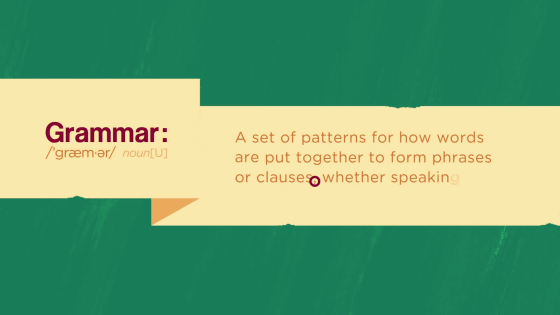Is "true grammar" really important in the conversation?

ByMcBeth
"Spoken language" which we usually use when talking to people is something that does not cause problems in communication even if grammar is wrong somewhat. Why are there "written words" and "spoken words" in the world and whether "correct spoken language" is really important,TEDHas released a movie on YouTube.
Does grammar matter? - Andreea S. Calude - YouTube
When talking to a friend interestingly funny and going into the palace of the story ... ...

Many people should feel sick if their opponent obstructs their story and "Correct about grammar with" Alien and me "instead of" Alien and me ".

But what if your grammar was truly wrong? And if the other person understands it even if the grammar is wrong, what is the problem?

In the first place, grammar is a pattern that combines words to make a phrase when talking or writing.

Different patterns exist in different languages. For example, in the case of English, the subject comes first, followed by the verb and the object.

On the other hand, in the case of Japanese, the object comes after the subject, and lastly the verb continues.

In the past, some scholars tried to specify patterns common to each language, but in addition to basic functions such as "having nouns and verbs", so-called "language universal characteristics" I could hardly find it.

On the other hand, all languages need a consistent pattern in order to function, but as a result of the spread of language studies, the term "prescriptivism" which states that languages should obey certain rules, or "diversity" There was also a debate as to whether it is based on "descriptivism" that changes with nature.

Originally, people used words in the act of "talking", but as the interactions in various parts of the world became complicated, the written language became important. Even those who belong to different communities to understand through standardized written language.

At this time, the spoken language varied from person to person, but the written language was standardized based on the language the person with power had talked about.

Language purists determined the detailed rules reflecting the grammar of the time ... ...

The written language was established in such a way that it was greatly affected by "spontaneous words".

As a result, it is also true that spontaneous deviations that deviated from the written language became thought to be a strange or those of society's low rank.

In recent research, spoken and written words are also regarded as separate phenomena with their own patterns and regularity, respectively.

Many of us are learning the spoken language as an "unconscious custom" rather than "learning as a rule" as children are young as they are not remembered.

And the spoken language you learn at this time is flexible that changes shape and meaning based on the atmosphere of the place and the presence of listeners.

In spontaneous words, complicated phrases that are difficult to understand in real time are avoided, changes are added to difficult-to-pronounce parts, and omission of sounds is born to speak quickly.

"Descriptivism" is an attempt to understand the differences of such languages without reference to "correctness" and to map them.

There is no "ideal form" like descriptiveism in descriptiveism, and in fact, it is important how "the language is used by people" is, and what kind of words has been born in the process , The change that we will follow.

Although the controversy of normism and descriptiveism continues even now, both are not exclusive existence.

In other words, normativeism is effective for communicating information to people, which is useful not only in formal situations but also in conversation by non-native speakers.

On the other hand, descriptiveism teaches "how we are thinking" and can describe the world in an intuitive way.

After all, it is best to think that grammar is "a set of language customs" that has been changed and reworked by various language groups. Language is like interworking complex and huge textiles with listeners and speakers, written and spoken language, normativeism and descriptiveism.

Related Posts:
in Video, Posted by darkhorse_log







